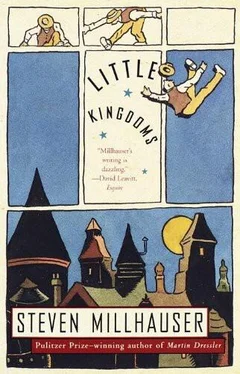Toward eleven the last light went out in the little house far up the river. Then pictures streamed in his mind: Cora in her lavender nightgown, Max and Cora laughing in the rowboat, Cora frowning and running a hand through her hair, Cora as a girl of ten in the Vaughn family album, wearing a white dress and straw hat and reaching up to pick a rose from the rose trellis. Then he imagined, in careful detail, Max making love to Cora; and when she reached her three short sharp cries, he began again from the beginning, more slowly, as if he had been a little hasty the first time, a little careless and irresponsible.
A sound startled him. When he turned his head sharply toward the door he felt a dizziness seize him, as if he had turned and stopped his head while his brain, unattached, continued to turn slowly. A dark form stood in the doorway.
“It’s late,” Franklin said. “You should be in bed.”
“You should be in bed too. She’s not coming back, you know.”
Toward dawn he stumbled and lay on the floor with a fiercely beating heart. Pictures streamed through the deep blue of the room: the façade of Klein’s Wonder Palace, his father’s finger rising and falling slowly as he counted out the numbers, the green leather chair in Judge Vaughn’s study, Cora’s hip bumping open the wooden screen door, a mouse scampering across the back of his hand in the cellar of his home in Plains Farms, Max’s tin mouse moving along the boards of the porch. He remembered his moonlit walk across the roof; and suddenly he longed to be out of this world entirely, up there on the cool white moon, far from his heavy body lying in blue light.
On the second day of his vigil Franklin walked about the house, looking in every room, as if he were searching for something, as if he were trying to solve a mystery.
On the third night of his vigil he returned to the tower and looked at the little yellow windows in the far trees and the wavering lights on the water. His temples pounded, his chest hurt, he felt heavy as a bag of loam but light, very light, as if at any moment he might float away, and when the lights in the house went out there appeared in his mind a journey to the moon: he saw terrifying ice caverns, haunting crevasses and fissures, white cities, melancholy moonfolk — and then the dangerous journey to the dark side of the moon, where the cartoon would burst into images of startling freedom and terror. He did not know exactly how it would end, but he knew already that it would be called Voyage to the Dark Side of the Moon and that it would be his longest effort — perhaps thirty minutes, which was to say, some 30,000 drawings.
Before dawn of the third night of his vigil, the details of the new cartoon were clear in his mind. Toward morning Franklin drew the shade over the window that looked toward Max’s house, went down to his room, and fell into deep, dreamless sleep.
His new life, once he had settled into it, was surprisingly like the old. It struck him that Cora had withdrawn from him gradually, so that her absence was merely the last step of a series to which he had almost grown accustomed. He hired Mrs. Henneman as a full-time housekeeper, whose primary duty was to look after Stella: to be in the house when Stella came home from school each day, to take care of Stella when she was sick, and to be with her during school holidays. She shopped and did the laundry, had charge of the groundskeeper, and prepared dinner five days a week, Monday through Friday. She combed Stella’s hair, tied her ribbons, sewed on her buttons and mended her petticoats; and she was given a special allowance for the purchase of Stella’s clothes. Sometimes on the weekends he hired her to be in the house for Stella, while he worked in the tower, but Stella preferred to sit with him in the high room, drawing quietly at a small table — keeping an eye on him, he sometimes thought.
For although she was still his grave and brooding daughter, he was aware of a change in her. Cora, even at her most distant, had a large and dramatic temperament; she filled doorways, swept into rooms, flung her head onto the backs of chairs in utter exhaustion. Stella had grown up warily, a little off to one side, where it was safe; she guarded her gestures, walked quietly as if to escape notice, led a secret, hidden life. Cora’s escape across the river had left the house lighter as well as emptier, and Stella, who at first had crept into some dark corner of herself, quickly felt the attractions of lightness and began to move about more freely. She expressed opinions clearly, told pointed anecdotes about school, and asked precise questions about Franklins work at the World Citizen , the management of household expenses, the operation of the furnace, the reason for the little holes at the side of a strip of film. Above all she asked technical questions about animated cartoons. Why did he fasten the sheets of paper with pegs instead of using the old crossmarks? Was it possible to make cartoons in color, like the Sunday comics? What about cartoons that talked? She invented an eight-panel comic strip of her own that she carried through six adventures, coloring the panels carefully with her pastel pencils and printing the words in the speech balloons in small capital letters; she overcame her fear of roller skates; and one day she asked for piano lessons. At first the sound of the piano made Franklin desperately unhappy, but he grew used to her simple tunes, her finger-strengthening exercises, her versions of “Oh, Dem Golden Slippers” and “My Old Kentucky Home.” In the mornings she checked to make certain his socks matched, since once he had worn a maroon and a brown, and to see that his vest was buttoned properly; at dinner she asked questions about his work at the office and listened attentively to his answers. Sometimes he detected in her a primness, a slight maternal fussiness, that secretly annoyed him, as if she were growing a little askew. Then he would pretend to be drunk and stagger around the room until she whooped with laughter. And once, stepping into the parlor, he saw her sitting motionless in the armchair, staring out the window; and when she turned to him he saw for a moment, before she leaped up to greet him, her grave eyes, stricken with sorrow.
His work for the World Citizen was going well. For some time Kroll had been obsessed by the issue of German reparations; at first he had insisted on immediate and unconditional payment as the one assurance of stability in postwar Europe, but the French occupation of the Ruhr had roused his indignation, and in a sharp reversal he had argued that Germany should pay at a fluctuating rate determined by her degree of economic prosperity. His opposition to the French adventure in the Ruhr led him to thunder against the dangers of French militarism, but at the same time he began to question the strength of the French armed forces and to hint that all was not well. Franklin had become adept at picturing a cruel, powerful, and vindictive France, setting its heel on a prostrate Germany, but he had also begun to reveal a talent for inventing variations on the theme of a weak, boastful, decadent, doddering France, concealing its impotence behind gestures of ridiculous vainglory. In a scribbled note, Kroll himself commended Franklin’s recent version of The Emperor’s New Clothes: in front of the Arc de Triomphe the gigantic, effeminate Emperor, with rings on his fingers and a long curly wig, marched naked before a stream of soldiers, while crowds along the Champs Élysées looked on doubtfully and a little boy in one corner pointed his finger. In front of the Emperor marched two tiny generals, who held up long poles between which was stretched a banner than concealed the Emperor’s genitals and read: CLOTHES PROVIDED BY PETAIN.
At home he hurled himself into Voyage to the Dark Side of the Moon. On weekday evenings he climbed to his tower study at half-past eight after reading Stella a bedtime story and came down at half-past midnight or one in the morning, and on the weekends he stayed shut up in the tower, coming down only to take an afternoon walk. Stella, who liked to be with him for much of the day, did not sit idly while he worked. It was her job to number the finished drawings, to erase carefully the pencil lines that showed through the India ink, to fasten each drawing to a cardboard backing, to attach the cardboard to the metal drum of the viewing machine, and to check carefully through the window of the machine for flickering due to faulty alignment. Franklin had modified his animation board: directly above the rectangle of glass he had screwed two pegs into the wood for exact registration of the drawings. In addition to his rice paper he had purchased a supply of transparent sheets of celluloid, which he used for moving figures during certain sequences. With a paper cutter he trimmed each piece of paper or celluloid to the proper size; then with a punch he carefully made two holes at the top, to fit over the pegs. He had arrived quickly at the moon, but the early lunar landscapes, with their mixture of enchantment and menace, were coming along slowly. His characters, a boy and his pet monkey, had to be led through three adventures, including a crash through the lunar surface and the discovery of an ancient underground civilization of Selenites, before he could bring them to the shore of the river that separated the white side of the moon from the dark side.
Читать дальше












